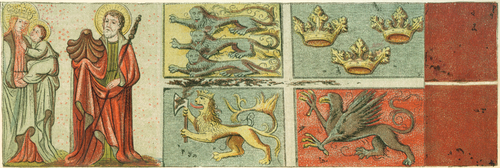Àdàkọ:POTD/2008-01-05
| Àwòrán Ọjọ́ Òní | |

|
|
|
A medieval ship flag captured by forces from Lübeck in the 1420s showed the arms of Denmark, Sweden, Norway and Pomerania. At the time, Denmark, Norway and Sweden were united in the Kalmar Union. The flag is believed to originate from the reign of king Eric of Pomerania due to its inclusion of Pomerania's griffin symbol. For the following five hundred years, the flag was displayed as a war trophy in a Lübeck church until destroyed during a World War II air raid on the city. An 1880s copy of the flag is preserved in the museum at Frederiksborg Palace, Denmark. The saint accompanying the Virgin Mary and infant Christ is Saint James the Greater, identified by his scallop shell emblem. The flag was made of coarse linen. All figures and heraldic insignia were created using oil-based paint. Image credit: Julius Magnus Petersen | |
